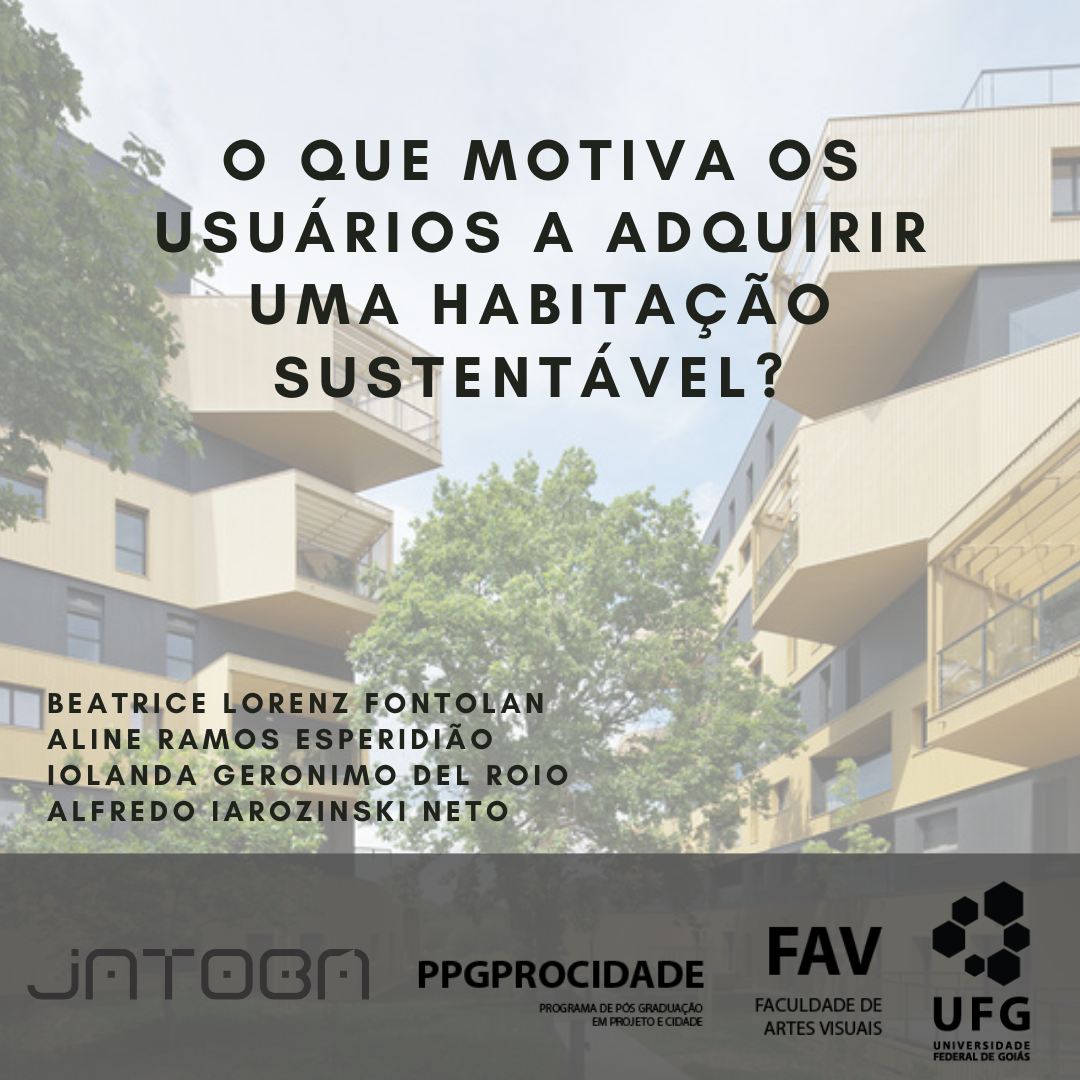What motivates users to purchase sustainable housing?
DOI:
https://doi.org/10.5216/revjat.v5.76001Keywords:
Indicators, Factor analysis, Sustainability, User, HousingAbstract
This study aims to identify which are the contributing factors for sustainability in housing in the user's perception. Data were extracted by the Survey procedure method. A questionnaire, structured with a seven-point semantic differential scale and 53 variables, was sent via the internet. Multivariate statistical analyzes of the data were performed - factor analysis, with the aid of the SPSS software. The results were stratified in order to obtain a sample that corresponded to the Brazilian population in terms of gender, with 163 results, covering the South, Southeast and Midwest regions. The analysis grouped the variables into eight factors based on their similarities, the most representative being: Resource efficiency, Legal and tax incentives and Relative value. It was verified that there are factors that are really influential and that must be disseminated, in a way that meets the needs and demands of users. Emphasis on environmental sustainability will not provide sufficient motivation if there is a lack of economic incentive and social acceptance. However, implementing incentives or legislation, regulations and codes without accompanying economic and social factors will not prove to be sustainable in the long term. Only by addressing the well-being of residents and providing the benefits associated with Sustainable Housing will interest in such housing increase.
Downloads
References
ADABRE, Michael Atafo; CHAN, Albert P. C. Modeling the Impact of Barriers on Sustainable Housing in Developing Countries. Journal of Urban Planning and Development, [s. l.], v. 147, n. 1, p. 05020032, 2021. Disponível em: http://ascelibrary.org/doi/10.1061/%28ASCE%29UP.1943-5444.0000639.
AGOPYAN, Vahan; JOHN, Vanderley Moacyr; GOLDENBERG, José. O desafio da sustentabilidade na construção civil. Série susted. São Paulo: Blucher, 2011.
DARKO, Amos; CHAN, Albert Ping Chuen; OWUSU, Emmanuel Kingsford. What are the green technologies for sustainable housing development? An empirical study in Ghana. Business Strategy & Development, [s. l.], v. 1, n. 2, p. 140–153, 2018. Disponível em: https://onlinelibrary.wiley.com/doi/10.1002/bsd2.18.
DÍAZ-LÓPEZ, Carmen et al. Identifying Public Policies to Promote Sustainable Building: A Proposal for Governmental Drivers Based on Stakeholder Perceptions. Sustainability, [s. l.], v. 13, n. 14, p. 7701, 2021. Disponível em: https://www.mdpi.com/2071-1050/13/14/7701.
DODGE DATA & ANALYTICS. SmartMarket Report World Green Building Trends 2018: South America , Central America and the Caribbean - Smart Market Report. Bedford: Research & Analytics, 2018a.
DODGE DATA & ANALYTICS. World Green Building Trends 2018 - Smart market reportSmart Market Report. Bedford: Research & Analytics, 2018b.
DURDYEV, Serdar et al. Sustainable Construction Industry in Cambodia: Awareness, Drivers and Barriers. Sustainability, Switzerland, v. 10, n. 2, p. 392, 2018. Disponível em: http://www.mdpi.com/2071-1050/10/2/392.
FAGANELLO, Adriana Macedo Patriota. Estudo sistêmico das inter-relações dos construtos que influenciam a satisfação residencial visando à elaboração de um modelo a partir da percepção cognitiva do indivíduo. 2019. 293 f. - Universidade Tecnológica Federal do Paraná, Curitiba, 2019.
FAVERO, Luiz Paulo; BELFIORE, Patricia. Manual de análise de dados: estatística e modelagem multivariada com Excel®, SPSS® e Stata®. 1. ed. Rio de Janeiro: Elsevier Brasil, 2017.
HAIR, Josefh F. et al. Análise multivariada de dados. 6. ed. Porto Alegre: Bookman, 2009.
HAIR JR, Joseph et al. Fundamentos de métodos de pesquisa em administração. Porto Alegre: Bookman, 2005.
HAKIMINEJAD, Ahmadreza; FU, Changfeng; MOHAMMADZADEH TITKANLOU, Hamideh. A critical review of sustainable built environment development in Iran. Proceedings of the Institution of Civil Engineers - Engineering Sustainability, [s. l.], v. 168, n. 3, p. 105–119, 2015. Disponível em: https://www.icevirtuallibrary.com/doi/10.1680/ensu.14.00017.
INTERGOVERNMENTAL PANEL ON CLIMATE CHANGE (IPCC). Climate Change 2022: Mitigation of Climate Change. Contribution of Working Group III to the Sixth Assessment Report of the Intergovernmental Panel on Climate Change (J. Malley P.R. Shukla, J. Skea, R. Slade, A. Al Khourdajie, R. van Diemen, D. McCollum, M. Pathak, S. Some, P. Vyas, R. Fradera, M. Belkacemi, A. Hasija, G. Lisboa, S. Luz, Org.). Cambridge, Reino Unido e Nova York, NY: Cambridge University Press, 2022.
KHAN, Rana Asad Javid; THAHEEM, Muhammad Jamaluddin; ALI, Tauha Hussain. Are Pakistani homebuyers ready to adopt sustainable housing? An insight into their willingness to pay. Energy Policy, [s. l.], v. 143, p. 111598, 2020. Disponível em: https://linkinghub.elsevier.com/retrieve/pii/S0301421520303360.
MAIA, Andréia Mara da Silveira. Os fatores críticos de sucesso nos projetos arquitetônicos de habitação de interesse social através do método Qualihabita. 2016. 136 f. - UFSC, Florianópolis, SC, 2016. Disponível em: https://repositorio.ufsc.br/xmlui/handle/123456789/174683.
MARSH, R. J.; BRENT, A. C.; DE KOCK, I. H. An integrative review of the potential barriers to and drivers of adopting and implementing sustainable construction in south africa. South African Journal of Industrial Engineering, [s. l.], v. 31, n. 3, p. 24–35, 2020.
OECD. Greening Household Behaviour: A review for policy makers. Paris: OECD Publishing, 2014.
OLULEYE, Ifeoluwa Benjamin; OGUNLEYE, Mukaila Bamidele; OYETUNJI, Abiodun Kolawole. Evaluation of the critical success factors for sustainable housing delivery: analytic hierarchy process approach. Journal of Engineering, Design and Technology, [s. l.], v. 19, n. 5, p. 1044–1062, 2020.
SALGADO, Mônica Santos. Arquitetura centrada no usuário ou no cliente? Uma reflexão sobre a qualidade do projeto. Em: FABRICIO, Márcio Minto; ORNSTEIN, Sheila Walbe (org.). Qualidade no Projeto de Edifícios. São Carlos: ANTAC, RiMa Editora, 2010.
SHOOSHTARIAN, Salman et al. Australia’s push to make residential housing sustainable - Do end-users care? Habitat International, [s. l.], v. 114, 2021.
WHANG, Seoung Wook; KIM, Sangyong. Balanced sustainable implementation in the construction industry: The perspective of Korean contractors. Energy and Buildings, [s. l.], v. 96, p. 76–85, 2015.
WU, Qian; ZHENG, Ziyang; LI, Wenbo. Can Housing Assets Affect the Chinese Residents’ Willingness to Pay for Green Housing? Frontiers in Psychology, [s. l.], v. 12, 2022. Disponível em: https://www.frontiersin.org/articles/10.3389/fpsyg.2021.782035/full.
YUE, Ting et al. Effects of perceived value on green consumption intention based on double-entry mental accounting: taking energy-efficient appliance purchase as an example. Environmental Science and Pollution Research, [s. l.], v. 28, n. 6, p. 7236–7248, 2021.
ZAHAN, Israt et al. Green purchase behavior towards green housing: an investigation of Bangladeshi consumers. Environmental Science and Pollution Research, [s. l.], v. 27, n. 31, p. 38745–38757, 2020. Disponível em: https://link.springer.com/10.1007/s11356-020-09926-3.
ZHANG, Lin et al. Key factors affecting informed consumers’ willingness to pay for green housing: A case study of Jinan, China. Sustainability (Switzerland), [s. l.], v. 10, n. 6, p. 7–8, 2018.
ZHANG, Yajing et al. Proposing a Value Field Model for Predicting Homebuyers’ Purchasing Behavior of Green Residential Buildings: A Case Study in China. Sustainability, Switzerland, v. 11, n. 23, p. 6877, 2019. Disponível em: https://www.mdpi.com/2071-1050/11/23/6877.
ZHANG, Qi; HIU-KWAN YUNG, Esther; HON-WAN CHAN, Edwin. Meshing Sustainability with Satisfaction: An Investigation of Residents’ Perceptions in Three Different Neighbourhoods in Chengdu, China. Land, [s. l.], v. 10, n. 11, p. 1280, 2021. Disponível em: https://www.mdpi.com/2073-445X/10/11/1280.
ZHAO, Shiwen; CHEN, Liwen. Exploring Residents’ Purchase Intention of Green Housings in China: An Extended Perspective of Perceived Value. International Journal of Environmental Research and Public Health, [s. l.], v. 18, n. 8, p. 4074, 2021. Disponível em: https://www.mdpi.com/1660-4601/18/8/4074.

Downloads
Published
How to Cite
Issue
Section
License
Copyright (c) 2023 Jatobá Journal

This work is licensed under a Creative Commons Attribution 4.0 International License.
- Autores mantém os direitos autorais e concedem à revista o direito de primeira publicação, com o trabalho simultaneamente licenciado sob a Licença Creative Commons Attribution 4.0 que permite o compartilhamento do trabalho com reconhecimento da autoria e publicação inicial nesta revista.
- Autores têm autorização para assumir contratos adicionais separadamente, para distribuição não-exclusiva da versão do trabalho publicada nesta revista (ex.: publicar em repositório institucional ou como capítulo de livro), com reconhecimento de autoria e publicação inicial nesta revista.
- Autores têm permissão para publicar e distribuir seu trabalho online (ex.: em repositórios institucionais ou na sua página pessoal) após a publicação inicial nesta revista, já que isso pode gerar alterações produtivas, bem como aumentar o impacto e a citação do trabalho publicado (Veja O Efeito do Acesso Livre).
- Foram feitos todos os esforços para identificar e creditar os detentores de direitos sobre as imagens publicadas. Se tem direitos sobre alguma destas imagens e não foi corretamente identificado, por favor, entre em contato com a revista Jatobá e publicaremos a correção num dos próximos números.














